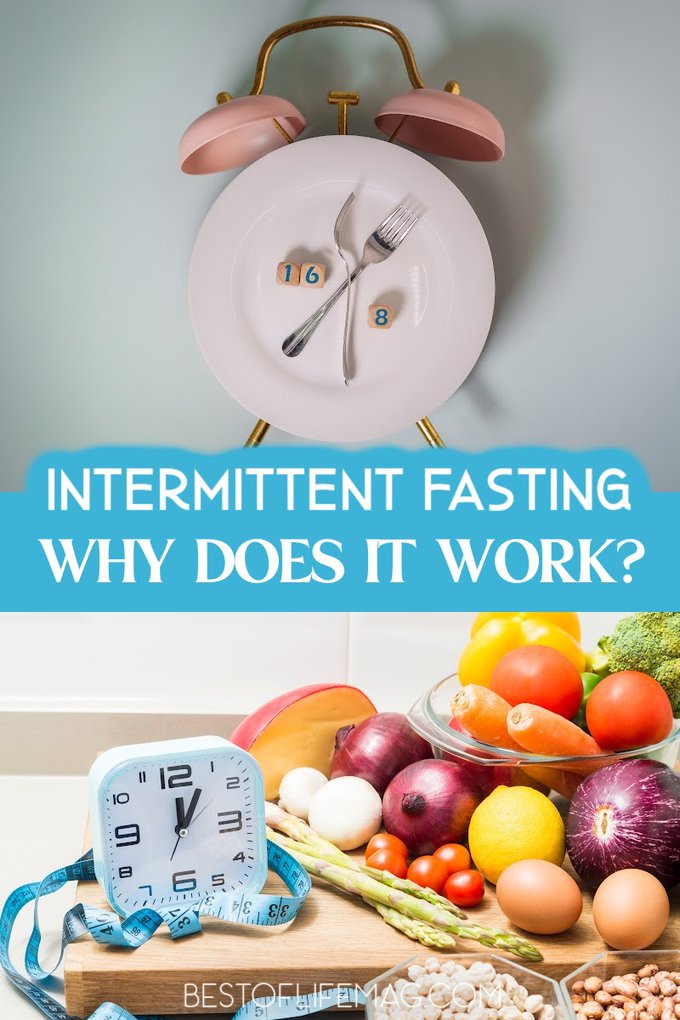Why Does Intermittent Fasting Work?
Intermittent fasting is gaining popularity in weight loss and health communities. Why does intermittent fasting work? It works for many reasons, making it one of the most recent go-to approaches for nutrition.
Why does intermittent fasting work? There are a variety of reasons that include benefits to your weight, your mental health, and the aging process.
What is intermittent fasting, and why does intermittent fasting work? First, it is important to understand what intermittent fasting is before you start anything.

Intermittent fasting is when you set a certain amount of time to eat during the day and then a greater amount of time in the day to refrain from eating.
Essentially, it is nothing more than giving yourself a different eating pattern. Of course, to do it the right way, when it’s time to eat, you need to eat healthy foods (like these), and when it’s not time to eat, you need to stick to it.

But there are many reasons why intermittent fasting works for weight loss, health, and fitness. There are a few ways to approach intermittent fasting, including the 16/8 or the 5:2 methods.
Each has similar sets of benefits and ways of reaching those benefits.
Why Does Intermittent Fasting Work?
Many of us are familiar with the idea of ketosis. Ketosis is when your body uses fat for energy due to a lack of carbs in your diet. Intermittent fasting isn’t the ideal way to get into ketosis, but it is one option.
Essentially, when you fast, your body is still looking for energy sources. If you aren’t eating because you’re in a fasting window, then your body will go into ketosis.
During a study, obese adults who followed the alternate-day fasting method lost roughly 13 pounds over eight weeks. The alternate-day method to intermittent fasting is when you eat 25% of your daily calories one day usually eat the next, and continue alternating.
Does Intermittent Fasting Work? | What is Causing Weight Loss
The body is a fascinating thing. To better understand how this process works, it would be a good idea to understand how fat is created. Your body is designed to ensure your survival, and food is an important part of that survival.
When we eat food, the body takes whatever we eat and uses the carbs as an energy source for our bodies. The insulin in our body helps to store energy by helping break down the carbs into glucose, which is linked together to create glycogen.

That glycogen is then stored in the liver or delivered straight to our muscles for energy use. The problem is we take in more carbs than our body needs, and your body doesn’t want you to lose that potential energy.
The glycogen is then stored in the liver or any other part of the body to be used for energy when needed. That storage is what we see as fat. The entire process is known as de-novo lipogenesis, which translates to “making new fat.”
There is no limit to how much fat can be stored, which means obesity is very possible and easy to fall into. Unfortunately, simply not eating does something entirely different.
Does Intermittent Fasting Work? | Not Eating
When we don’t eat, our body will start to use fat for energy. However, if the body isn’t getting any food at all, it goes into a state of panic and will only use small amounts of fats for energy to make sure you last longer.
That is why starving yourself simply won’t work. Not only is it unhealthy, but science also proves it won’t yield the results you may be seeking.

So, how do we get our body to use fat for energy without going into panic mode? Intermittent fasting. With intermittent fasting, you are still giving your body food so it won’t go into panic mode.
But when you reach your fasting window, your body will turn to stored fat for energy. Imagine if you lit your fat on fire; it would start to burn away. But eventually, the fire will engulf all of you, and you will die.
Having that window of time for eating allows you to put out the flames a bit so that you don’t get engulfed while burning fat. Intermittent fasting doesn’t only affect fat stored in the body; it helps in other ways, too.
Does Intermittent Fasting Work? | Mental Health
Intermittent fasting does a lot for your mental health as well. A study done in 2003 found that intermittent fasting accelerated the body’s process of cleaning out damaged cells and generating new ones.
This process also guards neurons in the brain from excitotoxic stress, essentially neuronal death. Also, by restricting caloric intake, 50 elderly adults had improved memory during a 2009 study.

Even people with mood disorders like depression found that their symptoms were weakened due to fewer calories. Ultimately, these studies found that less calorie intake means lower risk for neurodegenerative diseases like Alzheimer’s and Parkinson’s.
This is partially due to the number of calories consumed, weight loss, and reduction in obesity.
Does Intermittent Fasting Work? | Aging Process
When it comes to aging, many things factor into the visual side effects and tolls it takes on our bodies. Oxidative stress is one of them and can also lead to chronic diseases.
Oxidative stress involves free radicals in the body that attack important molecules like protein and even DNA. The damage to those molecules can lead to inflammation as well as other aging side effects.

Intermittent fasting enhances the body’s resistance to oxidative stress. Essentially, intermittent fasting fights off oxidative stress, which means less damage to proteins and DNA and, thus, fewer aging side effects.
Intermittent fasting also helps with heart health by improving heart disease risk factors like blood pressure, cholesterol, inflammation, and blood triglycerides.

Intermittent fasting also helps with cellular waste removal, a process known as autophagy. This is when cells break down and metabolize dysfunctional proteins that build up over time.
Intermittent fasting gets that process started and can help get it done faster.
More Health Tips
16/8 Intermittent Fasting Plan Tips | You will want to pick out a schedule, a plan that works for you.
10 Tips for Starting a Ketogenic Diet | How to Start a Keto Diet | Ketogenic diets combined with intermittent fasting can yield amazing results.
Healthy Slow Cooker Recipes with Chicken | Your slow cooker can help you stay on track with your health and your weight loss.
How to Stay Healthy During Flu Season | 6 Tips to Live By | Staying concerned about your health also means being concerned about flu season.
10 Tequila Facts for your Health (Seriously!) | Tequila is not exactly found in GNC, but that doesn’t mean there isn’t any health value.














